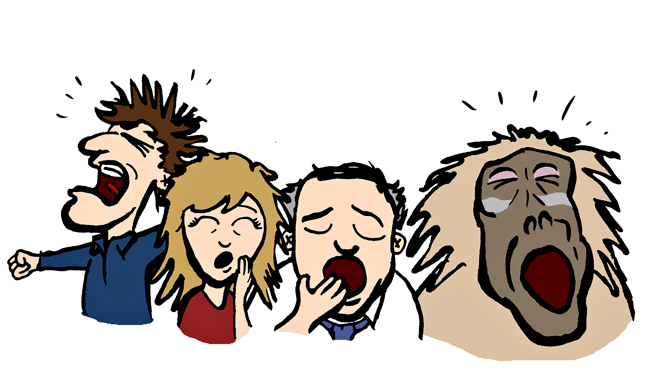Babies yawn. Animals yawn. In a way, fish yawn, and so do fetuses, though there’s some debate on the subject. You yawn when you’re bored in class or when you’re tired at the end of a long night of studying. There’s even a good chance that you’re yawning right now from reading about yawning. And, yet, we’re still not sure why we yawn.
The popular explanation is that we forget to breathe when we’re tired, so the body performs an involuntary action to take in fresh oxygen, but this doesn’t hold up to experiment. Putting subjects in an oxygen-rich environment, where each breath brings more oxygen to their brains, does not reduce the rate or intensity of yawns. Personal experience also refutes this idea: Situations where our brains don’t get enough oxygen do not result in more yawning. Run a mile on the treadmill or do twenty jumping jacks and you don’t yawn; you pant. Quick breaths bring oxygen to the brain faster than a larger yawn-induced breath.
As far as hypotheses go, the most compelling — and this is likely only a partial explanation — is social. Perhaps yawning is just a means to convey to other members of a group that the conversation has turned dull, in much the same way that smiling and laughter imply the opposite. And, much as we smile, cry and laugh alone, it’s a side effect that we also yawn when others aren’t around.
Contagious yawning has been confirmed in the lab, with empathetic people and species more prone to the effect, and this supports the social explanation since smiles, laughter and tears are similarly contagious. The effect extends across species, with empathetic monkey yawns relating to the amount of time that the two spend grooming each other. Additionally, in several animals, higher status individuals are more likely to initiate contagious yawns than those with a lower status.
But, far and away, the most significant implication of yawning, compulsive or otherwise, is that it’s a sign of mental exhaustion. If yawns are getting in the way of your all-nighter or preventing you from singing along with the radio while taking that long drive on I-35 toward Dallas, your body’s probably saying that it’s time to take a break or call it a night.















